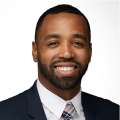Photo: Mikel Whittier joined UCLA Health in June as the director of Health Equity, Diversity and Inclusion.
Mikel Whittier joined UCLA Health in June as the director of Health Equity, Diversity and Inclusion, an office created in September of 2020 to advance health equity and justice in the workplace and for the diverse communities we serve.
Here, Whittier shares his vision for HEDI initiatives at UCLA Health, and how his past experiences will shape his approach to this role.
What are your responsibilities as HEDI director?
I serve as the subject matter expert on equity, diversity and inclusion. It is my responsibility to ensure leaders across the system understand and emphasize that everyone plays a critical role in advancing equity and creating a more inclusive environment for our patients and staff.
I’ll be collaborating with various UCLA Hospital and Clinic System and David Geffen School of Medicine leaders, staff, trainees, students and community partners.
Additionally, I hold myself and my colleagues accountable for including the various diverse voices in the strategic planning and execution processes. I’m committed to ensuring every voice is heard and included as UCLA Health grows and defines the future of health care.
How does your past work inform or guide your approach to HEDI in your role as director?
I believe that in order for UCLA Health to actualize true equity, diversity and inclusion, we have to integrate the principles and philosophies of EDI into the very foundation of our organization. We must view our organizational development efforts through an anti-bias, antiracism lens.
My background extends to quality and process improvement, organizational development and behavior management, public health and policy, mission integration and health equity solutions. These experiences will serve as a guide to inform how we improve every aspect of UCLA Health, including business operations – care delivery, patient and family experiences, workflows and talent management.
What opportunities and challenges do you see in going forward with this work?
The opportunities and challenges coincide. Every opportunity also represents a challenge.
The most exciting opportunity is that we get to define what the future of health care looks like. We get to determine how to properly include every culture, ethnicity, religion, ability, sexual preference, gender and all other social identities in this vision. We decide how to integrate anti-bias and antiracism with the principles of integrity, compassion, respect, teamwork and excellence with which we do our work.
Our values serve as the foundation to how we grow infrastructure to support EDI across the various service lines and business units. However, we must not be distracted by the tendency to search for completeness. EDI, like our society and health care, is constantly evolving.
We must celebrate our wins and continue to recognize there is much more work to be done. We must allow people to grow their understanding with compassion and grace. We must be courageous and speak out against injustices we witness and experience, but we must be even more courageous to do something about it.
It is a journey. While we are not responsible for the transgressions of the people before us, we are responsible to correct those actions to ensure we all are included and presented with the opportunity to thrive as we work toward UCLA Health’s mission.
Why is this work important to you?
I have seen many communities struggle to get the care they need to thrive. I have witnessed leaders ignore the needs of communities all over the country.
I have also personally experienced losing family members at an early age to cancer and other chronic illnesses, I have lost family to poor community health infrastructure and gun violence, and I have observed intentional pushback from legislatures on policies to advance health equity.
It is important to me to stand up against injustices, advocate and be a catalyst for change no matter where I am or who I’m up against. This is my why.
How will you measure success in this role?
Success in equity, diversity and inclusion is an ongoing process; it is the epitome of continuous quality improvement. Success will be felt, seen and reflected in data.
When it comes to my role specifically, success will look like a system-wide uptick in EDI strategies and EDI objectives integrated in the various business units’ yearly goals.
Success includes the following:
Reduced discrimination complaints;
Increased retention for underrepresented demographics;
Enhanced community partnerships;
Equitable representation in leadership roles;
Established HEDI support processes for leaders and emerging leaders;
Increased EDI alignment across the entire UCLA system;
Improved patient and family experience;
Increased access to care and enhanced transitions of care for divested communities and patient populations.
These are just a small sample of the measures for success across the system. The lasting impact will be improved patient care, elimination of waste and increased cost savings.
What do you like to do outside of work?
I’m a pretty adaptable person. I love having a good time – usually with my family and friends, or with making new friends.
I love playing with my niece and nephew. I love to cook and relax with good company. I love watching and playing basketball and football. I appreciate hikes, the outdoors and great food recommendations. I also like a good book, movie and debate like Kobe vs. Lebron vs. Jordan!
I’m the best at board games and pretty much anything that involves competition and trash talk. I just appreciate a good laugh and an overall fun time.
Read more about UCLA Health's Office of Health Equity, Diversity and Inclusion.




